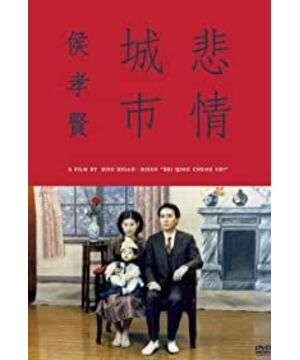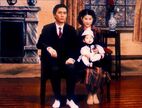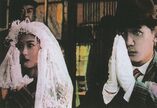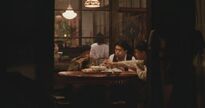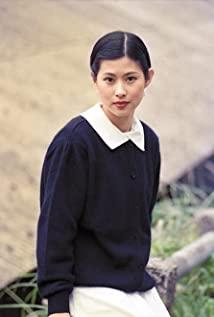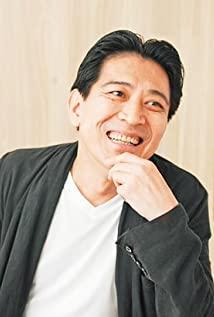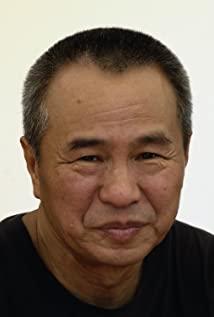A woman gave birth in pain, only a single candle, no lights. The news of Japan's unconditional surrender was playing on the radio. Lin Wenxiong was helpless amid the woman's mournful cries, worshipped God, smoked, drank water, and waited anxiously. "Fuck you mother, the electricity is not coming until now." Lifting the lampshade, it was only such a weak light. A cry and a cry broke through the darkness, and Lin Wenxiong's woman in Badouzi gave birth to a son for him. He was born in the dark and named it Guangming.
This was August 15, 1945, when Taiwan recovered and broke away from Japanese rule for 51 years. The sad island, the mountains and the water, the music of the Japanese spirit beats the chest, you are wrapped, stumbled into that era that you are not familiar with, the history is complicated, and there is a touch of sadness for those who were born in that era.
"It was also the Qing Dynasty who sold us at the beginning. Has anyone in the Treaty of Shimonoseki asked us Taiwanese if they would like it?" said Wu Nianzhen's role as Teacher Wu. "We are the most pitiful people on this island, the Japanese, the Chinese, everyone eats, everyone rides, no one hurts." This is what Wenxiong said.
The fourth son of the Lin family. The eldest son, Lin Wenxiong, presided over family affairs and ran a hotel. Later, he got involved in a gang fight and was shot to death by him. The second son, Lin Wensen, was recruited to Nanyang, and his wife waited for many years without any news. The third son, Lin Wenliang, was conscripted into Shanghai during the war. He was mentally ill when he returned, but fortunately recovered, he was involved in gang activities and was imprisoned. Eventually, his madness returned. The fourth son, Lin Wenqing, fell from a tree at the age of eight, and has since become deaf and mute. He runs a photo studio and is a progressive person with his friends. Wen Qing and his tolerant sister, Kuan Mei, got to know each other, wrote and communicated, knew each other, fell in love, and became husband and wife. After the 228 Incident, Taiwan was under martial law, tolerated and fled, but was eventually killed, Wen Qing was arrested, and his whereabouts were unknown. Kuanmei was left alone to raise the baby.
The choices in life have always been diverse. In the ups and downs of the generation, some people are willing to wither, and some people are eager to expand. The most difficult way is probably to be loyal to oneself. Tolerance, Wenqing, and other progressive youths chose this difficult path, and were finally extinguished by the bloody storm, leaving behind a passionate "Trilogy in Exile", wandering in the City of Sadness in Taipei, the sleepless port in Keelung, Jiufen distant mountains, clouds and sea.
"Leaving the motherland / dying to the motherland / life and destiny / no thoughts and no thoughts"
"When I am dead / I belong to the beautiful future of the motherland..."
"You want a dignified life/father is innocent"
"Dream"
No matter how the times are ups and downs, the most touching thing is always the love in the world. Eileen Chang said, "Hong Kong is a gorgeous but sad city." In fact, there is a long way to go. Which city is not?
"On the eighth day of the first month of November in the 20th year of the Showa era, it was a good day and there was a cloud. With a letter of introduction written by my father, I went up the mountain to work at the Miners' Hospital in Jinguashi. My brother was not free to teach, so he asked his good friend Wen Qing to come and pick me up. There is the coolness of autumn, and the scenery along the road is very good, and I feel happy when I think of being able to see such a beautiful scenery every day in the future." Kuan Mei's whisper is a gentle consolation in the sad city.
Wen Qing was deaf and dumb since childhood, and only communicated in writing, such as the subtitles in the silent film era, with a few words, restrained and concise. In Taiwan, where Japanese, Hokkien, Shanghainese, Cantonese and Cantonese were mixed at that time, everyone else was aphasia just like Wen Qing. And his silence is like a stop in the film. The tide of sadness is like the restless waves of the sea under Jiufen Mountain. Wen Qing could not hear the noise and strife, and his peace and tranquility with the world could not stop the sadness, and the heavy music still vaguely echoed in the rest.
"I'll always remember you / go flying / I'll come later / everyone is the same"
Shizuko, the Japanese girl he loved, left him a wooden sword and a poem before his brother died, and left sadly.
Kuanmei quietly wrote the story in the poem to Wenqing, "In the Meiji era, a girl committed suicide by jumping over a waterfall. She was neither world-weary nor despairing. She was facing such a splendid youth, and she was afraid that once it disappeared, she did not know what to do. It's better to be like cherry blossoms, when life is most beautiful, it leaves branches with the wind. Her suicide note inspired the young people at that time. At that time, it was the era of Meiji Restoration, full of enthusiasm and spirit."
Kuan Mei and Wen Qing That quiet love is like this text, it's a good day and there are clouds.
Love in troubled times is steadfastness and forbearance.
Shipped with
cherry
Although flying go
I'll follow all the same
"poetic"
The writing of images does not matter the truth, all the scenery is kindness rather than truth. Hou Hsiao-hsien said, "I hope I can photograph the activities of people under the laws of nature." It was only later that Hou Hsiao-hsien could clearly say that what he wanted was, like the scattering of clouds, moving forward one by one, walking, Before you know it, the movie ends. Cut it out, two hours and twenty-two minutes, and only one hundred shots.
Long shots, panoramic vistas and big vistas, the joys, sorrows and sorrows of ordinary people in the big era have all been reduced one by one, but they are shrouded in the image, and you cannot ignore their existence. After the February 28 incident, Wen Qing was in a panic and helpless at the entrance of the hospital. The arrogant eldest brother shouted angrily for the last time. Kuan Mei and Wen Qing looked at each other warmly and smiled while listening to the music. The last time they took a group photo, Wen Qing was calm in front of the mirror. After getting dressed, turning around, holding the camera and staring at his wife and children, a meaningful stare, the scene passed one second, two seconds, three seconds, and the heartbeat became more and more sad for one second, two seconds and three seconds; "This afternoon, I heard For the first time this year, the spring thunder was very loud, and it seemed to wake up the mountains and the sea..." There was no rain, only thunder, it seemed that the storm was about to come, and the torrential rain was coming. The second brother Wenliang, whose hands were bound, was also awakened by such thunder, tears in his eyes, but blurred again in the chaos of the world, and finally went crazy. Better go crazy.
Hou Hsiao-hsien pays attention to the depth of field. In the fixed shot, the scene of the characters is rich. You can clearly see the tearful eyes in the foreground, and you can also see the madness and frivolity in the depth of field. The panorama, the long-term perspective and the big long-term perspective, the complete alienation gesture, maintains a clear distance from the history, and cannot see clearly. It reflects the era, but it is only the era that Hou Hsiao-hsien sees and thinks. It is always limited by the author's own understanding. Hou Hsiao-hsien's attitude is objective. The paintings in the frame are full of old photos that have turned yellow from history. Those framing and covering are Hou Hsiao-hsien's, he cut and chose, so they exist in the works in such a limited way. An era of complete objectivity and integrity will never exist. He took a picture, painted the world of yesterday, and then took it out. He didn't seem to say anything, but he said everything. Those speechless stones, you see, are all here.
Just like painting, when you apply it unconsciously, Xu changed the flow of painting history. Screenwriter Zhu Tianwen mentioned in the book that the panoramic view is a style that is limited by conditions. In the eyes of the audience, it is also a style of its own, which cannot be learned and cannot be replaced. But I would rather believe that Hou Hsiao-hsien did it intentionally, whether it was limited to this point or adapted to local conditions.
Hou Hsiao-hsien took excerpts while writing the script. "The ins and outs of the incident are like a long river. If you can't start from the beginning, you can cut off the water and take a scoop to drink." This scoop has been in the core of the incident since the beginning, and it has been soaked through. He didn't need to explain to anyone at all. How vague, how real, you can see it really well, or you can be in the fog. In this film, in the story of the four sons of the Lin family, I glimpse the turbulent history of the depths of the scene. Born in such a generation, how can there be no undercurrent in life.
A city of sadness has been hailed as a Taiwanese epic, which seems to me more like a lyric poem. The epic focus is inexorably placed on historical events and spans, grand structure, plot and character construction. On poetry, the meaning of poetry lies in the music of poetry. Poetry expresses ambition, which is to express the desires, thoughts and emotions of the heart.
Poetry is not resolved by redemption, but in this lyric poem is a lifelong endless chanting, contemplation, and contemplation.
View more about A City of Sadness reviews


